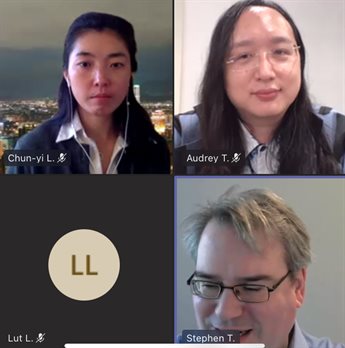The Taiwan Studies Programme (TSP) is delighted to announce an online panel discussion with Minister Audrey Tang, Taiwan's Digital Minister in charge of Social Innovation on: How digital innovation can fight pandemics and strengthen democracy?
A podcast of this talk can be found here.
If you are interested in attending online, please register on Eventbrite and your invite will be sent to you securely.
Dr. Chun-yi Lee is working with Professor Stephen Timmon and Prof. Yi-Hsin Elsa Hsu, Executive Master Program of Business Administration in Biotechnology, College of Management, Taipei Medical University on a pilot project of 'Public Policy in a time of crisis: A comparative Case Study of the British and Taiwanese Government Responses to Covid 19'
Panel discussion participants:
- Dr Chun-yi Lee Chair Person Taiwan Studies Programme, University of Nottingham
- Audrey Tang, Digital Minister of Taiwan
- Professor Stephen Timmons Nottingham University Business school, University of Nottingham
Abstract
When we see “internet of things”, let’s make it an internet of beings.
When we see “virtual reality”, let’s make it a shared reality.
When we see “machine learning”, let’s make it collaborative learning.
When we see “user experience”, let’s make it about human experience.
When we hear “the singularity is near”, let us remember: the Plurality is here.
Panelist biographies
Dr Chun-Yi Lee is Associate Professor at school of Politics and International Relations, University of Nottingham. She is also the director of Taiwan Studies Program at Nottingham. Chun-Yi's first book was published by Routledge in 2011: Taiwanese Business or Chinese Security Asset. The book is under Leiden Series in Modern East Asia History and Politics. Chun-Yi applied from the Economic and Social Research Council (ESRC) with Prof. Andreas Bieler on the project, 'Globalisation, national transformation and workers' rights: An analysis of Chinese labour within the global economy' in 2010. This project successfully received the funding from the ESRC and started to operate from October 2011 till September 2014. In viewing the Chinese labour facing the challenge of industrial upgrading, Chun-yi applied a research project funded by Chiang-Ching-kuo (CCK) Foundation in Taiwan in relation to 'Chinese Investment in Taiwan: Challenge or Opportunity for Taiwan's Industrial Development'. This project has finished in December 2016. Currently, Chun-yi is working on a public policy research project, to compare Taiwan and UK government's strategies to counter Covid-19. Meanwhile Chun-yi is working her second monograph on the topic of 'China's New Normal: The Impact of China's Rise on the Global Political Economy'.
Audrey Tang is Taiwan's Digital Minister in charge of Social Innovation.Audrey is known for revitalizing the computer languages Perl and Haskell, as well as building the online spreadsheet system EtherCalc in collaboration with Dan Bricklin.In the public sector, Audrey served on Taiwan national development council's open data committee and K-12 curriculum committee; and led the country's first e-Rulemaking project. In the private sector, Audrey worked as a consultant with Apple on computational linguistics, with Oxford University Press on crowd lexicography, and with Socialtext on social interaction design.In the social sector, Audrey actively contributes to g0v (“gov zero”), a vibrant community focusing on creating tools for the civil society, with the call to “fork the government.” Tang Feng has served as a number of administrative committee members of the Executive Yuan since October 1, 2016. Tang Feng is responsible for the three businesses of "Open Government", "Social Innovation" and "Youth Participation". Through the method of "starting from your own office", The clerks demonstrate how to use digital technology to simplify administrative procedures and improve the quality and transparency of discussion and decision-making.
In the past, Tang Feng served as a consultant for the Executive Yuan's Virtual World Regulations Adjustment Plan, a member of the Open Information Advisory Committee of the National Development Committee, and a member of the 12-year National Basic Education Curriculum Development Committee. In addition, Tang Feng is also a project contributor to the "g0v zero-time government" online community, and actively participates in the relevant activities of the online regulatory discussion platform vTaiwan, hoping to help output meet the expectations of multi-stakeholders through the establishment of multiple communication channels. The content of laws and regulations closer to actual needs. In terms of international exchanges, Tang Feng maintains cooperative relations with governments at all levels around the world in the field of digital governance, and continues to accumulate experience and achievements in "open government diplomacy" and "digital diplomacy".
Professor Stephen Timmons is Professor of Health Services Management and Director of the Centre for Health Innovation, Leadership & Learning, Nottingham University Business School. His research interests include implementation and innovation in health care, as well as the health care workforce.

Talk Reflection By Dr Mark Murphy, Taiwan Insight Editor
On the 4 November 2020, the Taiwan Studies Programme held a discussion, which was chaired by Dr Chun-yi and Professor Stephen Timmons, with Minister Audrey Tang, Taiwan’s Digital Minister in charge of Social Innovation. Audrey has helped implement Taiwan’s effective response to the pandemic. Audrey spoke about tackling the ‘infodemic.’ This represents data’s tendency to close itself off from the public, its transformation into conspiracy theory, or otherwise be utilised in a top-down manner. Thus, Audrey spoke about the importance of nurturing the public’s collective intelligence, trust and participation through digital mediums and open data. Whistleblowing should also be encouraged, along with community self-monitoring. Furthermore, we should also use ‘Humour over rumour’ in spreading useful information to get infection rates as low as possible. All in all, this was a timely intervention in helping us develop an effective pandemic response. At a time when people distrust the UK government, building trust is crucial.
A podcast of this talk can be found here.